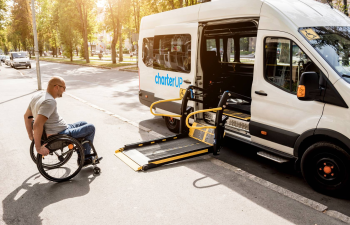
What Are Medical Transport Options for Elderly Patients?
Elderly patients often face mobility challenges, which can make it difficult for them to travel to and from medical appointments. Medical transport services designed specifically for seniors provide safe and comfortable options to meet their needs.
1. Non-Emergency Medical Transport (NEMT): NEMT services are non-urgent transportation options that provide door-to-door service for elderly patients. These services are typically scheduled in advance and can be used for routine medical appointments, such as doctor visits, physical therapy, and follow-up check-ups.
2. Assisted Transportation: For patients who require assistance getting in and out of the vehicle, medical transport services often include trained personnel to help them safely enter and exit the vehicle. This can be especially important for elderly patients who may have difficulty walking or standing for extended periods.
3. Long-Distance Medical Transport: Some elderly patients may need transportation for long-distance travel to specialized healthcare centers or rehabilitation facilities. Medical transport services offer long-distance options to ensure that seniors receive the care they need without the added stress of arranging travel themselves.
By providing access to medical appointments, these services help elderly patients maintain their health and well-being, reducing the likelihood of missed appointments and promoting better health outcomes.
How Can Wheelchair-Accessible Medical Transportation Assist Patients?
For patients who rely on a wheelchair for mobility, standard transportation options may not be suitable. Wheelchair-accessible medical transportation ensures that these patients can receive care while remaining comfortable and secure during their journey.
1. Wheelchair Vans: Wheelchair-accessible vans are specially equipped with ramps, lifts, and securement systems to accommodate wheelchair users. These vehicles allow patients to stay in their wheelchair during transport, reducing the risk of injury or discomfort associated with transferring in and out of a standard vehicle.
2. Accessibility Features: In addition to ramps and lifts, many wheelchair-accessible vehicles are equipped with features like spacious interiors, safety straps, and specialized seating to ensure the comfort and safety of the patient throughout the ride.
3. Assistance During the Ride: Some medical transportation services provide trained staff who assist with the patient’s needs during the ride, ensuring that they are secure and comfortable. These services may also offer additional assistance, such as helping the patient with personal care needs.
By offering wheelchair-accessible transportation, patients can continue attending essential medical appointments without the stress of arranging transportation on their own.
What Is Medical Transportation for Dialysis Appointments?
Dialysis is a life-saving treatment for individuals with kidney failure, but getting to and from dialysis appointments can be challenging, especially for patients who have limited mobility or no access to a personal vehicle.
1. Regular Dialysis Transport: Many patients require frequent dialysis treatments, which may require transportation to a dialysis center multiple times per week. Medical transport services that specialize in dialysis transportation offer scheduled rides to and from treatment centers, ensuring that patients can receive their dialysis without missing appointments.
2. Comfort and Safety: Dialysis patients often feel fatigued after treatment, making the journey home difficult. Medical transport services can provide a comfortable, safe environment for patients to rest during their ride, ensuring they arrive home securely after their treatment.
3. Reliable Scheduling: For dialysis patients, timely transportation is critical. Medical transportation providers offer reliable scheduling and door-to-door service, so patients can rest assured that they will arrive at their appointments on time and with minimal stress.
Medical transportation services for dialysis patients help ensure that these individuals maintain their health and receive the critical care they need without the added burden of transportation challenges.
What Are Private Pay Medical Transport Services?
Private pay medical transport services are an option for patients who do not have insurance coverage for transportation or prefer to pay out-of-pocket for their transportation needs.
1. Flexible Service Options: Private pay services offer a high degree of flexibility, allowing patients to schedule rides according to their specific needs. Whether it’s a one-time appointment or ongoing transportation, private pay services are designed to meet the needs of the patient.
2. No Insurance Hassle: For those without insurance coverage for medical transportation, private pay services provide a straightforward solution. Patients can pay for transportation as needed without navigating the complexities of insurance claims or limitations.
3. Personalized Service: Private pay medical transport services may offer more personalized care, including customized vehicle options, assistance during transport, and additional comfort measures.
Private pay services are an excellent option for patients who need reliable, customized transportation but do not have access to insurance-covered medical transport.
How Does Medical Transport for Cancer Treatment Work?
Cancer patients often need frequent and specialized medical transportation to attend chemotherapy, radiation therapy, and other treatments. Medical transport services cater to the unique needs of cancer patients, providing them with the support and care required during their treatment journey.
1. Safe and Comfortable Rides: Cancer treatments can leave patients feeling weak and fatigued, so it’s essential to provide transportation that is safe, comfortable, and supportive. Medical transport services offer vehicles that accommodate patients’ specific needs and ensure a smooth ride to and from their appointments.
2. Specialized Assistance: Medical transport services for cancer patients often provide trained staff who can assist with personal care needs, ensuring that patients are comfortable throughout their journey. This can be especially important for patients who are undergoing treatments that affect their mobility or physical strength.
3. Timely Appointments: Cancer treatments are often time-sensitive, so it’s critical that patients arrive on time. Medical transport services offer reliable scheduling and transportation to ensure that patients can attend their appointments without delays.
By utilizing medical transportation services, cancer patients can focus on their treatment and recovery, knowing that their transportation needs are being taken care of.
Conclusion
Medical transportation services play a vital role in ensuring that patients receive the care they need without the added stress of arranging transportation. Whether you’re an elderly patient, a dialysis patient, a cancer patient, or someone with special mobility needs, there are medical transportation options available to meet your unique requirements. From wheelchair-accessible vehicles to private pay services, these transportation options help improve access to healthcare, ensuring that patients can at...













